How to Create a Website: The Ultimate Guide
Have you always dreamt of having your own website, but don't know where to start? If so, you're in the right place: Below, we'll introduce you to the different options that are available, their advantages and disadvantages, as well as what you'll need to get your website online.
In this guide, we'll walk you through each step of planning and designing your website. Along the way, you'll be introduced to some of our favorite website-building programs and resources, and we'll let you know what to pay particularly close attention to.
Website builders offer the easiest way for creating a website.
Wix* was the best website builder from our sample that can be continuously used for free.
Alternatively, websites can be self-programmed, created with a CMS (like WordPress), or designed and built by a third party (freelancers/agency).
For the three alternatives listed in the last bullet point, you'll also need to register a domain and organize hosting on your own.
We've broken down the website creation process (and our guide) into three sections:
- 1.
Planning: Before creating a website, make sure that you can answer these basic questions about your project. Knowing the answers makes it easier to choose the best method for your needs.
- 2.
Creation: There are lots of ways to build a website, each of which has advantages and disadvantages. Depending on which you choose, you'll also need to purchase a domain and hosting.
- 3.
Optimization: A website is a never-ending work in progress. Even after it goes online, there will be plenty to do.
In the next few sections, we'll review each of these three phases step-by-step, letting you know how best to plan, create, and manage your website.
Plan Your Website
Having a good plan for your website won't only lead to a better result, but also optimize the entire process. Broadly speaking, there are three important questions to ask yourself: What do I need a website for? Which type of website is best for me/my project? What sort of budget do I/we have?
What Do You Need a Website For?
An excellent place to start is by identifying what you will use your website for. Everything else, from content to costs, depends on how you answer this simple question. Is the website for a private audience or a professional one? Are you designing it for yourself, your business, or your employer?
On EXPERTE.com, you'll find numerous guides for creating all sorts of websites:
Business Website
Websites are a must for any business, however, there are differences between a multinational corporation's digital presence and that of a startup.
Whatever the case, a business website must be professional and adhere to certain standards. Our guide to creating a professional website introduces some of the best practices in terms of design, content, technology, and security.

Professional websites aren't just for large corporations like Kärcher (Source: Kärcher).
Below, we've included several links to our business website guides:
Branch Websites
A business website should feature certain branch-specific content and tools. Restaurant websites, for example, need an interactive menu, while those for medical practices should have a scheduling tool.
If you're a freelancer or self-employed, a website is even more important, since it not only allows potential clients and customers to find you online but also gives you a place to showcase your portfolio or work. Be sure to include testimonials and references from past clients that attest to your qualifications and abilities.
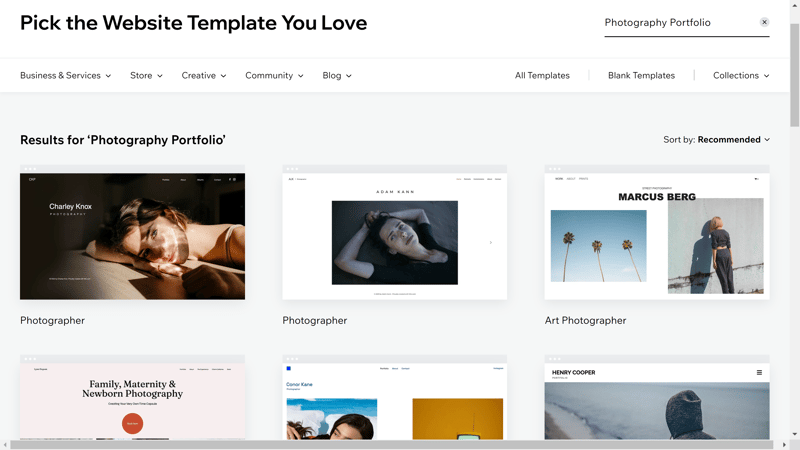
Website builders like Wix offer special templates for certain branches.
In our branch-specific guides below, you'll find plenty of tips and tricks for creating a range of business websites:
Website for Special Occasions
Whether you're applying to a competitive position or organizing your wedding: Some websites are designed for a very specific purpose or an event and have certain requirements.
Because wedding websites and other "purpose-built" sites are needed by those with no knowledge of programming or web design, there exist many beginner-friendly platforms for creating them. Website builders offer practical templates for a variety of event pages.
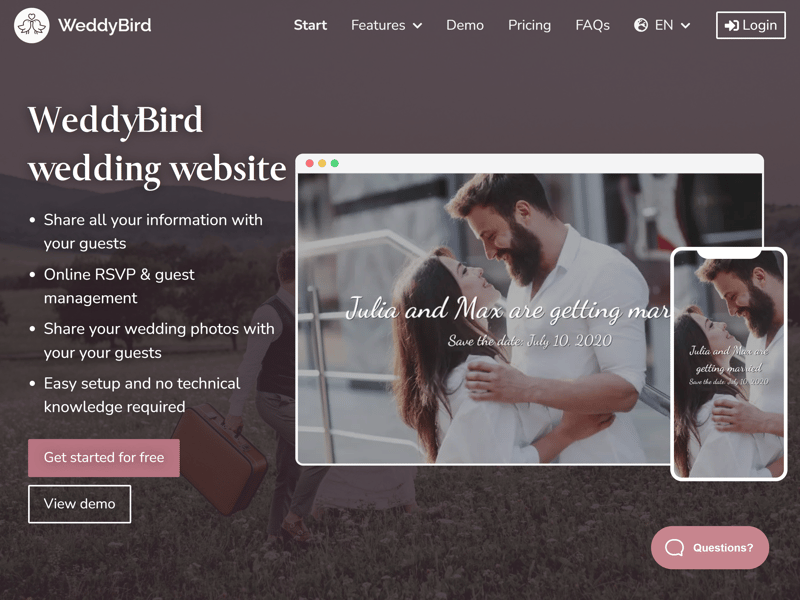
If you need a website for your wedding, you can try creating one with a specialized service, like WeddyBird.
In case you need a "purpose-built" or event website, be sure to check out our guides for these:
Which Type of Website Should I Make?
Just as important as knowing what purpose your website should serve is having an idea about what kind of site it should be. Some projects are more complicated, which generally means that they require both more effort and a bigger budget. Broadly speaking, when it comes to website types, you can select from the following:
Blog
Would you like to have a small corner of the Internet where you can share your thoughts with the world? If so, a straightforward blog could be more than enough. You can use it to write articles, post pictures or videos, and categorize your entries.Dedicated blog software and website builders with built-in blog templates make creating one of these particularly easy.
Difficulty: Easy
One-page website/one pager
Perhaps you've wondered what the difference is between a website and a homepage. Homepages are a website's main page, however, there exist entire websites that are just one page. Known as one pagers, visitors can get all the information they need on a single page. Since they're so compact, they're great for small businesses or specific purposes (like portfolios).A landing page is a type of one pager that's optimized for conversions.
Difficulty: Easy to medium
Regular website
If a one pager is too limiting, you'll need a regular, multi-page website. This is the go-to option for small businesses and generally consists of a homepage and several subpages (for example, "About Us", "Contact", and "Services", etc.).Difficulty: Medium
Advanced websites
Corporations and businesses that are expecting lots of visitors will need something more substantial than a regular website. To keep up with visitor expectations and demands, more features and even self-developed web applications are required.Difficulty: Medium to hard
Online store
If you're planning to sell products on your website or want an online store, you'll need ecommerce tools, such as product management, the ability to accept payments, delivery options, and marketing features.Difficulty: Medium to hard
What's Your Budget?
Practical considerations, such as the size of your budget, also play an important role in determining what sort of website you'll be able to create. While a small investment is necessary for any professional website, how much you actually pay depends largely on the method you select: If funds are unlimited, hire an expert or agency. On the other hand, taking a more hands-on approach will keep costs down.
Luckily, there are solutions for any budget these days. Completely free websites are possible., however, they're only suitable for private projects, and not corporate or business ones.
Create a Website: Which Options Are There?
Should you have a basic idea of what you want your website to look like, it's time to decide how to make it. Broadly speaking, there are four options:
- 1.
Program it yourself
- 2.
Hire someone else to do it, like a freelance web designer.
- 3.
Build it using a content management system.
- 4.
Create it with a website builder.
Let's take a closer look at each of these:
Program a Website Yourself
Beginners can skip to the next option since our first method is only for pros. To program a professional website on your own, you're going to need advanced HTML, CSS, and coding skills, as well as knowledge of everything else that goes along with a website. This includes technical aspects, design, security, and more.
The advantage of this approach is that you'll have complete freedom in terms of your website's design and features. Your skills (and budget) are the only two limitations since practically anything is possible.
Keep in mind that the amount of expertise needed to create a professional and functional website from the ground up is significant - chances are that if you're reading this guide, your skills aren't up to the task.
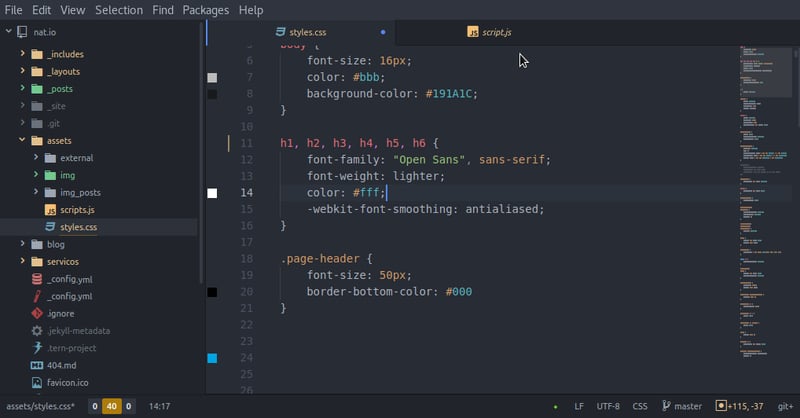
Self-programming a website from scratch is only an option for pros.
Advantages and Disadvantages of Self-Programming a Website
100 % flexibility: By programming everything yourself, you can do what you want without being limited by the features a website builder or CMS offers.
Total design freedom: The only limitation to your creativity is what you're able to program. You won't need to communicate with programmers and designers or work with the templates a website builder offers.
Lots of experience necessary: HTML, CSS, FTP: Even for a 'basic' website, you'll need quite an array of technical skills. The more features you want to integrate, the harder your task will be.
Considerable effort: Even if you have the technical know-how, you'll need to have enough time to bring your vision to life. Hiring someone to build the website for you could prove more cost-effective in the long term.
Have Your Website Created for You
In case programming isn't your strong suit and you have the necessary budget, you can pay pros to create it for you. When taking this approach, you'll have a few different options:
Agencies: A good agency handles the planning, design, launch, and management of your website. You'll either be in touch with a single specialist or an entire team responsible for everything about your website. Keep in mind that since good agencies usually employ experts for each area of web design and development, you'll need to pay a premium.
Freelancers: Agencies are typically just collections of freelancers, so why not cut out the figurative middleman and work directly with a specialist? Not only will you save money, but on freelancer platforms like Upwork, Freelance.com, or Fiverr, you'll be able to select an expert capable of bringing your vision to life. This puts all of your eggs in one basket though, so make sure to choose someone reputable and reliable.
Warning: On platforms like Upwork, you'll often find freelancers who are unbelievably affordable, charging just a few dollars per hour. While it's possible to get a good deal, remember that your website is a long-term investment - cutting corners early on can create major problems later when scaling up.
Quality comes at a price. For that reason, chances are greater that you'll be more satisfied with the finished product when hiring freelancers at fair rates.
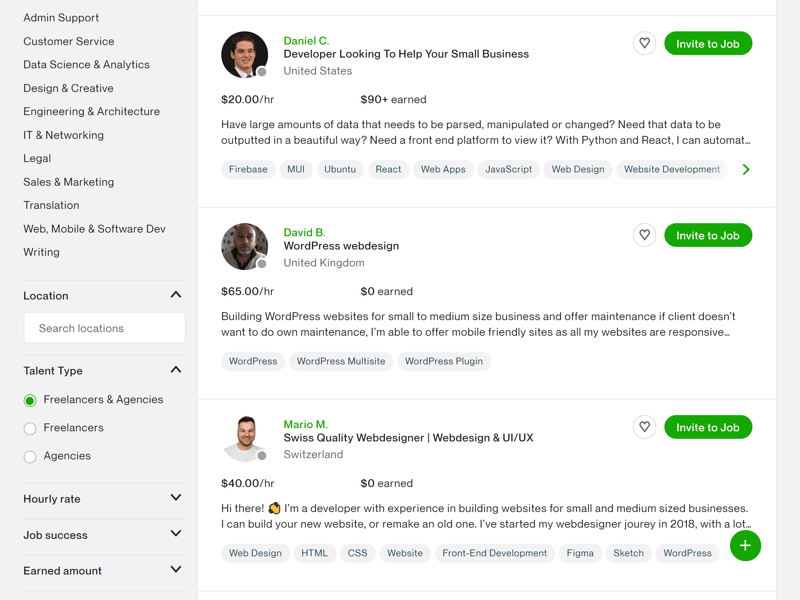
There are plenty of eager freelancers of platforms like Upwork, willing to help you design and create your website.
Advantages and Disadvantages of Having a Website Programmed for You
Huge selection, for every budget: There are plenty of web design freelancers and agencies that do nothing more than create websites. Solutions exist for every budget and branch.
Flexibility: With the right partner, you can bring nearly any vision to life. Communicate your ideas and wishes clearly. Just remember that the more complicated your requirements are, the more they'll cost.
Always stay in touch: If you work with an agency or freelancer, you'll have someone to interact with at any time regarding questions, issues, or changes.
Expensive: Even though there are options for any budget, 'good' programmers and designers know their worth and charge accordingly. A professional website can cost anywhere from $1,500-$20,000, or even more.
Varying quality: Complete satisfaction is never guaranteed: You'll only know if the finished website aligns with your taste when the project is nearing completion. For that reason, be selective when choosing a freelancer or agency and try to reduce misunderstandings by clearly communicating your wishes and desires.
Create Your Website With a CMS
For a more hands-on approach to website building that doesn't require a site builder, you can try a CMS, like WordPress. Otherwise known as content management systems, these handle most of the coding for you: Their preprogrammed website components only need to be configured to your specifications. They also come with numerous design templates (Themes) and plugins, to help you design and customize your website.
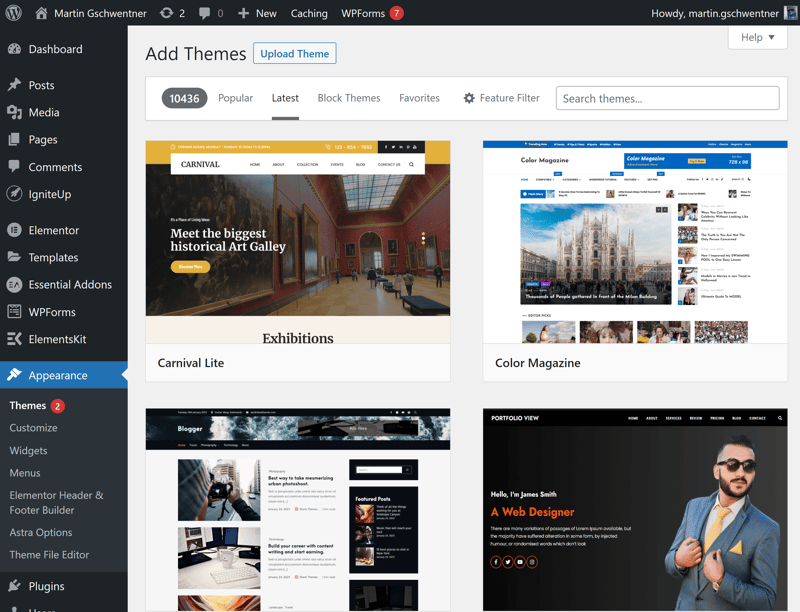
With WordPress, you'll design your website using its numerous themes.
You will have to handle things like hosting on your own. Still, there are hosting providers that specialize in WordPress websites, offering all-in-one packages that include hosting and a domain, as well as support and maintenance.
Thanks to CMSs like WordPress, even those without programming knowledge can create their own website, and with significantly more flexibility than website builders (which we'll introduce next).
Of course, WordPress isn't the only CMS on the market, and there are alternatives such as Joomla or TYPO3. Still, WordPress is both the undisputed market leader (and easily the most popular platform) and the most beginner-friendly CMS.
Advantages and Disadvantages of Using a CMS to Create a Website
Free and open source: Most CMSs, like WordPress, are open source and free to use (you pay for your website's hosting and domain). As such, they make it possible to affordably create a web project.
Flexible and scalable: When using a CMS, you'll have significantly more control over your website than you would with a website builder. In terms of features, design, and content, you're in charge.
Lots of plugins: WordPress seems to have a plugin for any features you might want. Installing these is easy too, and only requires a few clicks.
Endless themes: WordPress's design templates make it possible for anyone to create a visually-appealing website without any programming skills or experience. Lots of free and premium themes are available.
Difficult to set up: Managing a website with a CMS is easy, however, getting started can be tricky (at least in comparison to a website builder).
Programming skills are advantageous: You don't need to know how to code in order to use a CMS, however, some basic knowledge will allow you to get the most out of the platform you're using.
Initiative required: If using a CMS like WordPress, you'll need to handle hosting, a domain, security, and backups.
Use a Website Builder to Create a Site
The easiest way to create a website is with a website builder. These web-based programs allow anyone to make a professional-looking website without a shred of programming skills in a short amount of time.
Thanks to their ready-made elements and visual interfaces (often with drag and drop), you'll create your professional website in an absolute minimum of time. From straightforward blogs to extensive online stores, just about anything is possible.
Every website builder is slightly different, however, they all share a few basic features:
Templates and designs
You don't start from scratch with a website builder. Ready-made templates make sure that your website is visually balanced: All you have to do is fill them with content.Building system
Website builders visualize intricate coding processes in browser-based editors. Users drag and drop ready-made website elements, placing and arranging them at will.Blogging features
Blogs are popular and an excellent way to add new content to any website. Every good website builder should offer blogging features.Ecommerce
Most website builders offer users the ability to create online stores. Good product management, plenty of customization options, as well as tax, delivery, payment, and marketing settings and tools, are all important. Typically, there are significant differences between platforms in these areas so find the combination that best matches your needs.Image galleries & photo editing
Websites are visual mediums. Image galleries with stock photos and intuitive photo editing tools are important.Analytics & statistics
In order to know how your website is doing as well as what is and isn't working, your building software should make some analytics tools available (or, at the very least, allow external software to be easily integrated).App market
Even the best website builders from our list don't offer every feature users need out of the box. Thankfully, most have app markets where additional tools can be installed or purchased.Mobile apps
As phones and tablets become more powerful, website owners have started managing and building on the go using their platform's mobile apps.
Of course, when it comes to features, usage concepts, and target audiences, there are significant differences from platform to platform. Still, most services are fairly similar to one another, offering the same advantages and disadvantages.
Advantages and Disadvantages of Using a Website Builder
Well-suited for complete beginners: You don't need any programming or web design know-how to use a website builder and access all of its basic features. As such, anyone can make a professional-looking website with one in a fairly short amount of time.
All-in-one: Website builders make creating a web presence easy thanks to their all-in-one approach: You don't need to give a second thought to hosting, your domain, or security since your provider handles this for you. Even advanced features, like marketing, SEO, or ecommerce, are included.
Affordable and flexible monthly pricing: Access to most website builders is usually subscription based, with a variety of different options offered for users depending on their needs. A professional website with a domain and hosting should cost around $15 per month.
Limited features and customization options: In exchange for all of their ease of use and convenience, website builders restrict creative freedom. Each platform is limited by its integrated features as well as what its editor is capable of. Don't expect the same degree of flexibility as our other methods.
Design by numbers: Since website builders come with ready-made design templates and elements, your finished product might look similar to other websites.
Technical disadvantages: Websites built with a website builder usually can't compete with independently programmed ones in terms of search engine optimization or loading times.
EXPERTE.com's Website Builder Test
These days, the market is full of website builders all of which make similar promises, while offering slightly different features and capabilities. In our comprehensive EXPERTE.com website builder comparison we tested 15 of the most popular platforms and have compiled a shortlist of our favorites for you:
Our Winner: Wix, the Best All-Around Website Builder

Wix took first place in our ranking owing to its excellent combination of quality and quantity in an unbeatable package. Creating a website is kept simple for beginners, while more advanced users can take advantage of the platform's relative flexibility.
With its rulers and guides, Wix's interface might remind you of Photoshop but isn't anywhere near as complicated. Thanks to its toolbar and drag and drop design features, you're given a fairly free hand when building your website. You'll get plenty of ready-made content, ranging from individual elements to entire pages and content blocks.
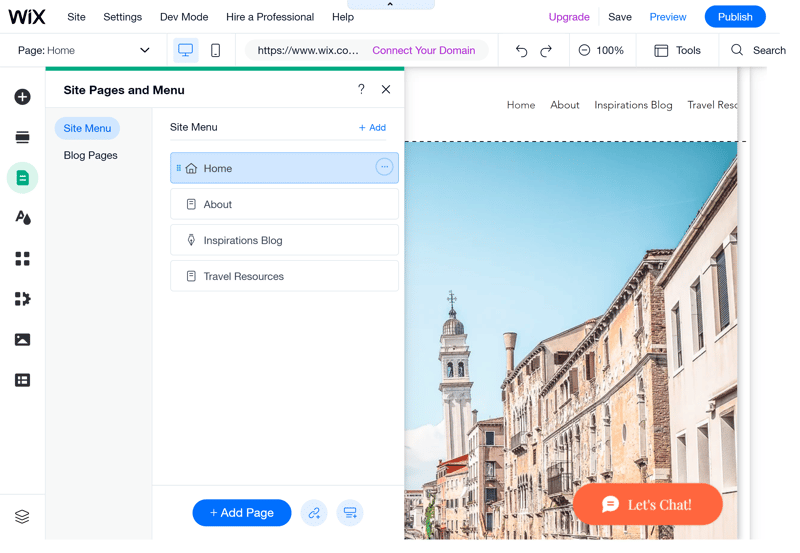
Wix was EXPERTE.com's top website builder pick.
In case the features that the platform comes with aren't enough, you can browse its impressive app market. There, seemingly endless numbers of extensions (both free and premium) are waiting for you.
For total beginners, Wix even offers a more straightforward, AI-assisted editor that basically automates website creation. If using this, you'll have to make do with significantly less creative freedom than the regular editor offers.







Choosing the Right Domain
Just like every home needs a plot of land, so too does a website need a domain. Put simply, this is a website's unique name and the address where it can be reached. This website's domain is www.experte.com.
Two components of this domain are particularly important: The so-called second-level domain ("experte") and the top-level domain, or domain ending (".com").
Register a Domain
In order for your website to be available on the Internet, you'll need to select a domain ending and register a domain on it. The difficulty emerges in that every domain can only be assigned once, meaning that the "good" names have already been taken.
Not only will you need to find a memorable domain name, but also make sure that it isn't taken, and that its domain ending pertains to your intended use. For US businesses, both .com and .us are attractive options, with each within the Top 5 domain endings on the planet. However, there are lots of other possibilities: Among tech startups, .io domains are very popular, for example.
Registering a domain online is very simple. Once you've selected a domain name, visit the domain provider of your choice and make sure that the domain is still available.
Most domain providers have simple search tools that allow you to check whether a name is available. This is what IONOS's looks like:
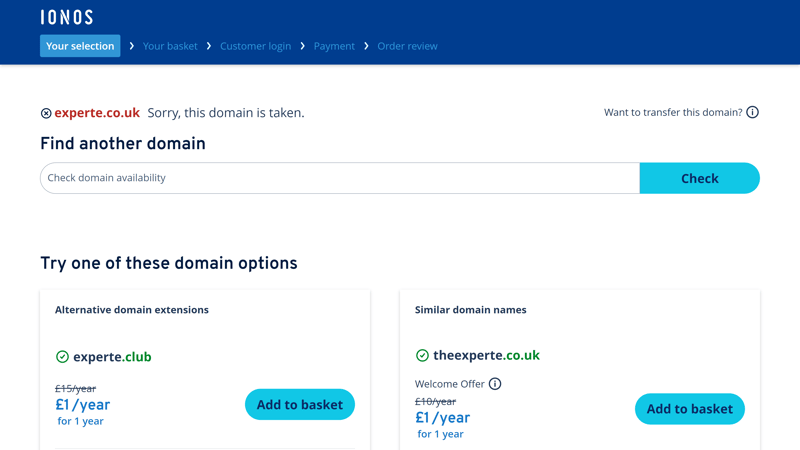
If a domain is available, you can begin the process of registering it.
Is your desired domain available? Congratulations: You can purchase it from the provider for a fixed price. The domain provider will let you know all of the next steps once your purchase is complete.
If you're using a website builder, you can often directly purchase your website's domain without needing to buy it from a provider. Making things even better: The domain is usually free for the first year.
Purchase a Domain
Things become a bit trickier if your desired domain is already registered. In that case, you'll either need to select a different domain (such as by slightly modifying your original choice) or, you could try to purchase the domain from its current owner.
In our guide to purchasing a domain, we show you how to do this, as well as how you can sell or migrate domains:
Find the Right Hosting
Another aspect that you'll need to take care of is hosting. This online storage space (sometimes called 'web space') provides the digital 'plot' which your website is built upon. Regardless of your website's size, whether it's a blog, a business page, or an online store, it will need to be hosted on a server that's connected to the Internet.
There are different kinds of hosting: You can purchase and operate your own server, or rent web space from a hosting provider. Some hosting companies have even specialized in catering to websites made with specific CMSs, like WordPress.
Below, we've briefly summarized the various options:
Use Your Own Server
Using your own server is an appealing option for larger web projects that need top performance, a high degree of scalability, and the ability to customize server configuration. Keep in mind that having more control also means that you'll be responsible for your server's security.
Several different types of servers exist:
Dedicated server: This option is for you and you alone. You won't need to share the server's resources and performance with other customers and have total control over its configuration.
vServer: A vServer is a virtual server on a computing system. Hardware is shared with others, however, your virtual server belongs only to you and acts like a dedicated server. This variant is appealing since it costs less than a dedicated server while offering a similar level of performance.
Cloud server: These are also virtual, however, unlike vServers, it's possible to adjust resources and settings, such as computing performance, storage space, and RAM, in real-time. Another benefit is that you can purchase capabilities based on your needs.
Managed server: With a managed server, your hosting provider handles software installation, regular backups, and security. You get all of the benefits and flexibility of having your own server but can leave its upkeep to the pros.
Hosting
For smaller web projects and regular business websites, having your own server is probably overkill. Hosting offers a useful and practical alternative: You'll rent storage space for your project on a server that's shared with many other clients (for this reason, the process is sometimes referred to as "shared hosting").
Server management is handled entirely by the hosting provider which means that you don't need to worry about anything. The downside is that hosting providers can be less flexible when it comes to installing certain software or advanced configurations.
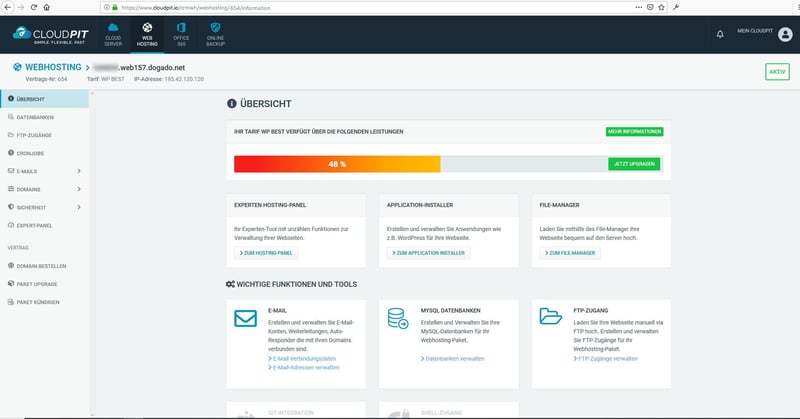
With hosting providers like dogado, you'll manage your online storage space through a convenient web interface.
Since the server's hardware is shared with so many others, there are limitations when it comes to performance. This method isn't ideal for websites with large numbers of visitors or many pages that don't want to risk occasional performance issues or unavailability.
For most regular online projects, whether a private website or a small- to medium-sized business, shared hosting is more than adequate.
WordPress Hosting
If you're using WordPress to build your website, you can try WordPress hosting. This specializes in supporting websites that use the CMS, and since they're optimized for WordPress environments, offers several advantages:
WordPress comes pre-installed, or can be installed with a few clicks; You don't need to manually install the software.
These hosting providers handle many aspects for you, such as maintenance, security checks, and backups.
Since they're optimized for WordPress, they'll likely perform better and be more scalable.
After Launch: Optimize Your Website
Did your website go live? Congratulations, you've gotten yourself online! However, this isn't the time to sit back and relax: Websites are never-ending projects and there will always be something to do, improve, or update, whether it's content, design, or features.
In addition to a variety of guides of tutorials to help you along the way and to improve your website, EXPERTE.com also offers a number of practical website tools for optimizing technical aspects and content.
User Experience & Accessibility
Everyone's tastes and preferences are different, however, there are some objective criteria that distinguish a good user experience on a website from a bad one. As soon as you know in which areas your website isn't performing, you can improve them. EXPERTE.com offers several tools to help you find out what these are:
Page Experience Checker
With our Page Experience Checker, you'll evaluate what sort of experience visitors to your website have according to a number of fixed metrics and criteria. These include factors such as loading speed, interactivity, and visual stability.
Readability Checker
Our Readability Checker determines the readability of articles and text content on your website using an index and several pre-configured metrics. With it, you can see how easy, or difficult, your texts are to read and gauge whether they are suitable for your target group.
Accessibility Test
Can those with disabilities or handicaps view and use your website as well as others? Find out with our Accessibility Checker.
Using 41 factors grouped into 8 categories, you'll be able to determine how you can optimize your website for the visually disabled or those who are hard of hearing. With this tool, you can make sure that as many of your website's visitors can access its content and features as possible.
For the visually disabled, color contrast is particularly important. Use our Color Contrast Checker to see whether your website's color scheme makes its content too difficult to read.
Mobile Friendliness
Most people surf the Internet on their smartphones. A significant number of visitors to your website will access it through a mobile device of some sort, and you should make sure that it's optimized for them. Our Mobile Friendly Checker helps you to do this.
With our tool, you can check up to 500 pages to see how mobile-friendly they are.
Security
A valid SSL certificate is particularly important since this guarantees that information sent between a visitor's browser and your website's server is encrypted. Thankfully, there are plenty of free SSL certificates, these days, foremost among them, those from Let’s Encrypt.
If you'd like to find out how secure your website is and probe it for gaps and weaknesses, you can use our Security Check and SSL Checker.
Performance
Visitors are picky these days: If a site takes too long to load or performs poorly in another area, potential customers will quickly take their business elsewhere. For that reason, you should ensure that your website's technical aspects aren't driving away clients.
Thankfully, there are a number of metrics that you can use to measure your website's performance. Based on the results, you can focus on optimizing those areas. To find out how your site is doing, and learn how to improve it be sure to run our PageSpeed Test and check out our performance guides:







Conclusion
Websites are no longer just a luxury for businesses and the self-employed, but an absolute must. Luckily, there are lots of ways to establish your digital presence, and it's never been easier to do so.
Regardless of whether you want to program your website yourself, hire pros to do it for you, or take a hands-on approach with a content management system or website builder, we're here to help. On EXPERTE.com, you'll find tutorials, guides, software reviews, and practical tools to help you make your website as professionally, easily, and efficiently as possible.
FAQs
Broadly speaking, you have four options: You can program it yourself, pay experts to code it for you, use a content management system like WordPress, or design it with a website builder.
The cost of a website depends on many different factors, such as how it's made and its complexity. If hiring pros, expect to pay anywhere from $1,500-$20,000, however, this is just a rough estimate. With a website builder, depending on the subscription tier you choose, $10-$40 per month is likely. With an open source CMS like WordPress, you'll 'only' pay for hosting and a domain, or $5-$15 per month.
Some website builders offer free, ad-financed subscriptions. You won't be able to use a custom domain though, and will have limited (or no) access to many features. Free subscriptions are not a viable option for creating professional websites or online stores.
A website builder is a web-based tool that allows users to create a website, even if they don't have any programming knowledge. This is achieved by visualizing complex coding processes and intuitive tools. Ready-made templates can be customized to your liking, while content can be placed by dragging and dropping in user-friendly editors.
If you'd like to pay someone else to make your website for you, start by looking for web design agencies or freelancers. You can either use a regular Internet search or check on freelancer platforms like Upwork.com.



















































